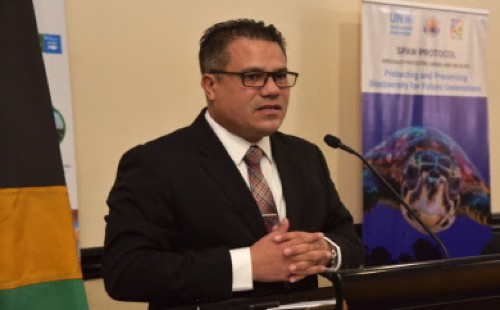Jamaica Reaffirms Commitment to Ratify Specially Protected Areas and Wildlife Protocol
KINGSTON, Jamaica – Jamaica has reaffirmed its commitment to ratifying the Specially Protected Areas and Wildlife (SPAW) Protocol of the Cartagena Convention, saying it requires one final step, which is the amendment to the Wildlife Protection Act.
 Jamaica’s Minister of Water, Environment and Climate Change Matthew Samuda“I would have seen what I hope to be the last version before it goes to Parliament within the coming weeks as a parliamentary schedule takes shape now that Jamaica would have gone through its most recent elections,” Minister of Water, Environment and Climate Change Matthew Samuda, told the opening ceremony for the United Nations Environment Programme (UNEP) Eighteenth Meeting of the Contracting Parties (COP18) for the Cartagena Convention.
Jamaica’s Minister of Water, Environment and Climate Change Matthew Samuda“I would have seen what I hope to be the last version before it goes to Parliament within the coming weeks as a parliamentary schedule takes shape now that Jamaica would have gone through its most recent elections,” Minister of Water, Environment and Climate Change Matthew Samuda, told the opening ceremony for the United Nations Environment Programme (UNEP) Eighteenth Meeting of the Contracting Parties (COP18) for the Cartagena Convention.
Samuda told the meeting that ends on Thursday that Jamaica is not ratifying the SPAW Protocol from a perspective of symbolism, but because the country acknowledges the principles and the benefits of the Cartagena Convention.
“We acknowledge that the SPAW Protocol brings to life greater protection for our oceans,” he said, noting that as they deliberate in the coming days, it is easy to feel frustrated with the pace at which things are happening.
“We’ve all seen the impact of ocean acidification; we’ve all seen dying corals; we’ve all seen deteriorating water quality; we’ve all seen the impact of warming seas and in some cases rising sea levels as we’re experiencing,” he said.
However, Samuda said there is hope, as he has seen the impact of the multilateral process on dealing with the issue of fishing subsidies at the World Trade Organization (WTO) and the third United Nations Ocean Conference as well as the Intergovernmental Negotiating Committee on the plastics treaty.
“There can be creeping frustration, there can be a sense that this is an academic exercise, but I ask you in your deliberations and in your discussions and your bilaterals and your individual meetings, that we redouble our efforts to strengthen the efforts of the Convention Secretariat, to ensure that we strengthen the intention to protect our seas,” he said.
Samuda said that the High Ambition Coalition for Nature and People (HAC) goal of protecting 30 per cent of the planet’s land and ocean by 2030 in 1983 was very far-fetched.
“It means the multilateral process, though slow, does achieve what you want over time,” he said.
The United Nations Environment Programme (UNEP) Eighteenth Meeting of the Contracting Parties (COP18) for the Cartagena Convention brings together governments and partners from the wider Caribbean region to discuss and implement solutions for protecting marine biodiversity, reducing pollution, and strengthening regional cooperation.
Discussions will include new recommendations on Sargassum management, waste water, and pollution control under the LBS Protocol, as well as advancing work on the SPAW Protocol concerning marine mammals and wetlands.


